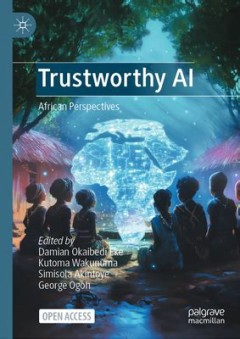Filter by

Wohnen in Gesundheit = Die Corona-Pandemie und Teilhabe in besonderen Wohnfor…
In diesem Open-Access-Buch wird die Coronapandemie in besonderen Wohneinrichtungen der Eingliederungshilfe im sozialwissenschaftlichen Blick erfasst. Die Lagebeschreibung spiegelt verschiedene Perspektiven: die Einschätzungen von Menschen mit Beeinträchtigungen, Leitungsverantwortlichen, Fachpersonal und Angehörigen. Die Daten wurden bundesweit während der Lockdown-Phasen in einer qualitati…
- Edition
- -
- ISBN/ISSN
- 9783658464523
- Collation
- XXVII, 206 hlm; ill., lamp.,
- Series Title
- -
- Call Number
- -

Well-being During the Pandemic = Comparative Perspectives from the Global Nor…
This open access book focuses on the impact of the COVID-19 pandemic on well-being, happiness and quality of life, taking into account the mediating effects of social inequalities. The volume brings together and into dialogue the different experiences and perspectives of countries and researchers from the Global North and South. Expert scholars from across the world have analyzed empirical data…
- Edition
- -
- ISBN/ISSN
- 9783031634406
- Collation
- XIII, 295hlm; ill., lamp.,
- Series Title
- -
- Call Number
- -

Weirding Landscapes = Arctic Glacier Extinction and Monsters of the Anthropocene
This open access book investigates human-environment relations in the context of the anthropocenic Arctic. Through an archaeological and anthropological study of landscape, it wields “weirding” – a creative mode of engagement with the world – as a means of coming to terms with the stranger, experiential dimensions of a planet populated by diverse non-human entities often bearing monstro…
- Edition
- -
- ISBN/ISSN
- 9783031850165
- Collation
- XXVIII, 200 hlm; ill., lamp.,
- Series Title
- -
- Call Number
- -

Understanding Turbulent Systems = Progress in Particle Dynamics Modeling
This open access book provides a thorough introduction to modeling turbulent, dispersed, two-phase flows. It explains the physical phenomena and governing laws at play, followed by a clear and systematic overview of the statistical tools used to develop simplified or coarse-grained models. With a pedagogical approach, the book uses practical examples to explain complex physical processes and…
- Edition
- -
- ISBN/ISSN
- 9783031844669
- Collation
- XIX, 284 hlm; ill., lamp.,
- Series Title
- -
- Call Number
- -

Understanding and Developing Student Assessment Literacy = Translating Resear…
This book provides research-based approaches and classroom strategies for frontline teachers and practitioners, to aid them in formulating actionable approaches to develop student assessment literacy (SAL) in school and higher education sectors. This book helps readers to: Understand the concept of SAL and its significant role in assisting students’ achievements of desirable learning goals…
- Edition
- -
- ISBN/ISSN
- 9789819794843
- Collation
- VI, 76 hlm; ill., lamp.,
- Series Title
- -
- Call Number
- -

Trustworthy AI = African Perspectives
This book is an Open Access Publication. The Guidelines for Trustworthy AI developed by the European Commission High-Level Expert Group on AI is a framework that has been developed to promote and achieve the trustworthiness of AI systems. It provides seven ethical principles that can be operationalised in socio-technical systems to realise responsible AI design and deployment. The content of th…
- Edition
- -
- ISBN/ISSN
- 9783031756740
- Collation
- XXVII, 281 hlm; ill., lamp.,
- Series Title
- -
- Call Number
- -

Traditionen juristisch-notarieller Textproduktion durch Translation = Zapotek…
Dieses Open Access-Buch bietet eine historisch ausgerichtete Untersuchung juristisch-notarieller Dokumente aus Neu-Spanien an der Schnittstelle zwischen romanistischer Textlinguistik und Translationswissenschaft. Konkret wird ein umfassendes Korpus aus Texten der indigenen Selbstverwaltung und Rechtsprechung analysiert, die in einer peripheren Region des kolonialen Mexiko zwischen dem 17. und 1…
- Edition
- -
- ISBN/ISSN
- 9783662694671
- Collation
- XXI, 534 hlm; ill., lamp.,
- Series Title
- -
- Call Number
- -

Pflegefachpersonen als pflegende Angehörige
In diesem Open-Access-Buch stehen Pflegefachpersonen im Zentrum, die zugleich pflegende Angehörige sind. Als professionell Pflegende verfügen sie über Fachwissen, pflegefachliche Kompetenzen und Kenntnisse zum Versorgungssystem. Als pflegende Angehörige sind sie persönlich betroffen. Die qualitative Studie fokussiert auf das Erleben der Doppelrolle als beruflich Pflegende und zugleich pfle…
- Edition
- 1
- ISBN/ISSN
- 978-3-658-40972-2
- Collation
- XV, 127
- Series Title
- -
- Call Number
- -

Time in Education Policy Transfer = The Seven Temporalities of Global School …
This open access book investigates a topic underexplored in policy transfer: time. Drawing on well-known theories from comparative education, public policy studies, political science, and sociology, but written in an easy-to-understand language, the author discusses seven temporalities of policy transfer: historical period, future, sequence, timing, lifespan, age, and tempo. The temporal dimens…
- Edition
- -
- ISBN/ISSN
- 9783031825248
- Collation
- XV, 242hlm,: ill, lamp; 21 cm
- Series Title
- -
- Call Number
- -

The Theory of Chinese Modernization
This open access book explores China's unique path to modernization, highlighting its journey from ancient civilization to modern society. It examines China's efforts from the mid-19th century's internal and external struggles to its contemporary economic achievements. The book covers historical, social, and economic aspects, emphasizing the balance between autonomous development and global int…
- Edition
- 1
- ISBN/ISSN
- 9789819780662
- Collation
- XXV, 481 hlm; ill., lamp.,
- Series Title
- -
- Call Number
- -
 Computer Science, Information & General Works
Computer Science, Information & General Works  Philosophy & Psychology
Philosophy & Psychology  Religion
Religion  Social Sciences
Social Sciences  Language
Language  Pure Science
Pure Science  Applied Sciences
Applied Sciences  Art & Recreation
Art & Recreation  Literature
Literature  History & Geography
History & Geography